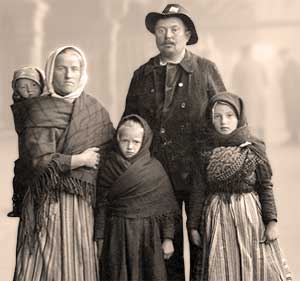The Haves...and the Have Nots
Charles Dickens describes the burden of poor families
Charles Dickens - Condensed from American Notes - 1842
Cant as we may, and as we shall to the end of all things, it is
very much harder for the poor to be virtuous than it is for the
rich; and the good that is in them, shines the brighter for it. In
many a noble mansion lives a man, the best of husbands and of
fathers, whose private worth in both capacities is justly lauded to
the skies.  But bring him here, upon this crowded deck. Strip from
his fair young wife her silken dress and jewels, unbind her braided
hair, stamp early wrinkles on her brow, pinch her pale cheek with
care and much privation, array her faded form in coarsely patched
attire, let there be nothing but his love to set her forth or deck
her out, and you shall put it to the proof indeed.
But bring him here, upon this crowded deck. Strip from
his fair young wife her silken dress and jewels, unbind her braided
hair, stamp early wrinkles on her brow, pinch her pale cheek with
care and much privation, array her faded form in coarsely patched
attire, let there be nothing but his love to set her forth or deck
her out, and you shall put it to the proof indeed.
So change his station in the world, that he shall see in those young things who climb about his knee: not records of his wealth and name: but little wrestlers with him for his daily bread; so many poachers on his scanty meal; so many units to divide his every sum of comfort, and farther to reduce its small amount. In lieu of the endearments of childhood in its sweetest aspect, heap upon him all its pains and wants, its sicknesses and ills, its fretfulness, caprice, and querulous endurance: let its prattle be, not of engaging infant fancies, but of cold, and thirst, and hunger: and if his fatherly affection outlive all this, and he be patient, watchful, tender; careful of his children's lives, and mindful always of their joys and sorrows; then send him back to Parliament, and Pulpit, and to Quarter Sessions, and when he hears fine talk of the depravity of those who live from hand to mouth, and labour hard to do it, let him speak up, as one who knows, and tell those holders forth that they, by parallel with such a class, should be High Angels in their daily lives, and lay but humble siege to Heaven at last.
Which of us shall say what he would be, if such realities, with small relief or change all through his days, were his! Looking round upon these people: far from home, houseless, indigent, wandering, weary with travel and hard living: and seeing how patiently they nursed and tended their young children: how they consulted ever their wants first, then half supplied their own; what gentle ministers of hope and faith the women were; how the men profited by their example; and how very, very seldom even a moment's petulance or harsh complaint broke out among them: I felt a stronger love and honour of my kind come glowing on my heart, and wished to God there had been many Atheists in the better part of human nature there, to read this simple lesson in the book of Life (American Notes-Pictures from Italy, p. 211-212).
Back to the Dickens in America Page Copyright © 1997-
David A. Perdue, All Rights Reserved.
Copyright © 1997-
David A. Perdue, All Rights Reserved.